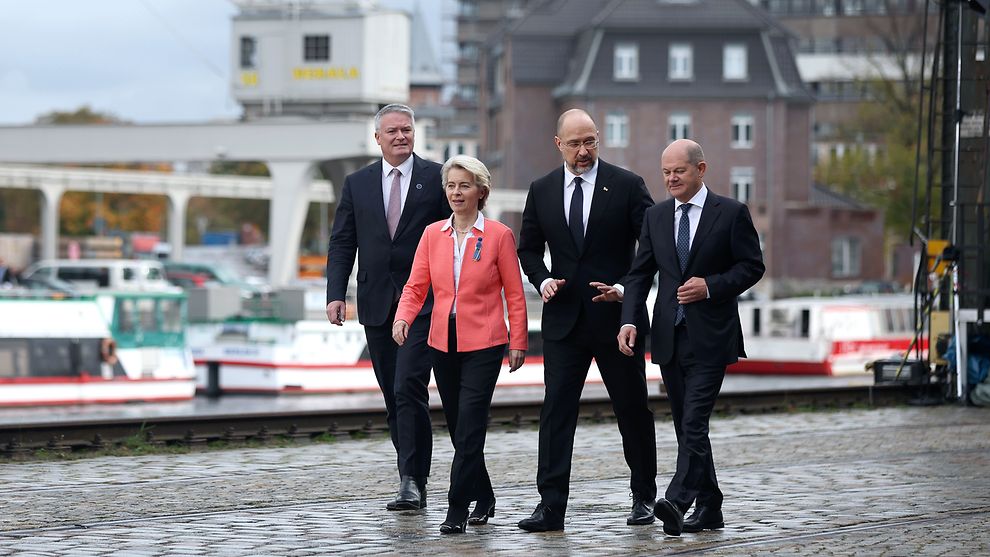
The guests received in Berlin by Federal Chancellor Olaf Scholz and EU Commission President Ursula von der Leyen include Denys Shmyhal, Prime Minister of Ukraine.
German Federal Government/Hartmann
Even as the German economy is facing the largest downturn since World War II, some countries still believe that, in Germany, money grows on trees. Ukraine fits into this category. Presidential economic advisor Alexander Rodnyansky told German media, ahead of the ‘Reconstruction Conference’ in Berlin, that his country is hoping Germany will support Ukrainian rebuilding efforts with €500 million a month. “It’s about a reliable schedule—at least for the coming half year,” said Rodnyansky.
In total, Ukraine is pushing for “four-to-five billion dollars” for its economy, “especially looking ahead to 2023,” said Rodnyansky.
Ukraine, furthermore, hopes that the EU might contribute around €2 billion.
This money would be earmarked to rebuild the destroyed infrastructure in Ukraine, a process that should start immediately, according to Oleksiy Chernyshov, minister of regional development. He explained how this financial assistance is in the best interests of Germany: “The faster we repair our infrastructure, especially the social infrastructure like hospitals, kindergartens, and schools, the faster Ukrainian refugees will return home.” Chernyshov described the occasion for donation as “an opportunity for the German economy,” as Germany could play a vital role in rebuilding Ukraine.
The German Chancellor Olaf Scholz called the rebuilding efforts “a generational task,” one in which “it is important to create a sign of hope.” Party head Saskia Esken of the SPD, however, already developed an idea of how to fund the rebuilding efforts:
In order to finance a state that is capable of acting, that shows solidarity, that holds society together in our country, that supports reconstruction in Ukraine and at the same time does not turn a blind eye to the global hunger crisis, we must finally implement a solidarity-based wealth tax on the super-rich.
While the German government continues to support Ukraine financially and persists in implementing rigid sanctions against Russia, the German economy has been aching for months. Many German companies have either halted production or gone insolvent due to high energy costs. In the latest developments, even kindergartens are being shut down for the winter as they cannot afford to heat their facilities. Inflation in Germany is now exceeding 10% (the change in the consumer price index compared to the same month in the previous year) and Germans are increasingly worried about how to make ends meet. The notion of a wealthy German able to spend large sums at will has become an image of the past.
